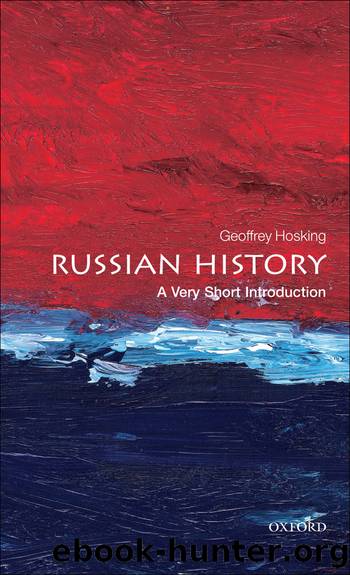Russian History: A Very Short Introduction by Geoffrey Hosking

Author:Geoffrey Hosking [Hosking, Geoffrey]
Language: eng
Format: epub
Tags: history, General, Russia & the Former Soviet Union
ISBN: 9780199580989
Google: JKDyso34ZvAC
Publisher: OUP Oxford
Published: 2012-03-29T00:28:01.761551+00:00
A changing society
The effect of the reforms was to create a much more changeable and differentiated society. With the construction of railways (culminating in the Trans-Siberian, completed in 1903), communications improved greatly. Heavy industry, hitherto largely military, branched out into other fields, and consumer manufacture developed rapidly. Because of Russiaâs weak currency, though, its faltering rule of law, and its cumbersome procedure for setting up joint-stock companies, much industry was owned by foreigners. Russia was threatened with becoming economically colonized, like China or the Ottoman Empire.
The way was now open for peasants to become literate, to diversify their economy, to work in the towns, on the railways and rivers, to serve in the army, and then return to civilian life. A whole new class of professional people emerged (nearly all men), trained in higher or technical educational institutions, and working for the state, the zemstvos, or the armed forces as doctors, lawyers, teachers, accountants, and administrators. New newspapers and journals appeared, each trying to appeal to a broad and growing educated public; no longer was serious discussion confined to small circles of intellectuals. Public opinion (obshchestvennost) took shape for the first time as a force independent of direct state tutelage. Its members were now able to participate in local government and in the organization of their own professions, but they were still excluded from politics at the centre, nor could they be confident of the rule of law or the security of civil rights. The more frustrated and strident among them constituted a new sociocultural stratum, divorced from both state and people, the intelligentsia â a new concept which Russia gave to the world.
The result was a paradoxical state of affairs. Civil society and the state were both growing stronger simultaneously, but as opponents, not as partners. The state depended for its conduct of local affairs largely on the Ministry of the Interior and on the provincial governors and police officials subordinate to it. Those officials had a wide range of ill-defined duties: it has been estimated that each provincial governor had an average of 300 to 400 official papers to deal with every day. Unable to cope with the flood, he tended to rely on personal links to trusted subordinates, to senior officials in St Petersburg, and on his right of personal report to the Emperor. District police chiefs faced the same situation in miniature, with the governor as their highest reference point, and exercised their responsibilities with minimal regard for strict legality, since they knew that administrative instructions always had priority.
The 1860s reforms made the political system even less coherent. The provincial and district zemstvos had no institutional links either upwards, to the government, nor sideways to provincial governors and district police chiefs, nor downwards, to the purely peasant volost. The chairman of each zemstvo, the noble marshal, would of course get to know these officials personally and negotiate some kind of modus vivendi. But he too had a plethora of functions, and no staff to support him; moreover, he was unpaid.
Download
This site does not store any files on its server. We only index and link to content provided by other sites. Please contact the content providers to delete copyright contents if any and email us, we'll remove relevant links or contents immediately.
Zero to IPO: Over $1 Trillion of Actionable Advice from the World's Most Successful Entrepreneurs by Frederic Kerrest(4529)
Machine Learning at Scale with H2O by Gregory Keys | David Whiting(4296)
Never by Ken Follett(3937)
Harry Potter and the Goblet Of Fire by J.K. Rowling(3848)
Ogilvy on Advertising by David Ogilvy(3609)
Shadow of Night by Deborah Harkness(3361)
The Man Who Died Twice by Richard Osman(3073)
Book of Life by Deborah Harkness(2934)
The Tipping Point by Malcolm Gladwell(2914)
Will by Will Smith(2911)
0041152001443424520 .pdf by Unknown(2843)
Purple Hibiscus by Chimamanda Ngozi Adichie(2828)
My Brilliant Friend by Elena Ferrante(2824)
How Proust Can Change Your Life by Alain De Botton(2808)
How to Pay Zero Taxes, 2018 by Jeff A. Schnepper(2646)
Hooked: A Dark, Contemporary Romance (Never After Series) by Emily McIntire(2551)
Rationality by Steven Pinker(2352)
Can't Hurt Me: Master Your Mind and Defy the Odds - Clean Edition by David Goggins(2324)
Borders by unknow(2304)
